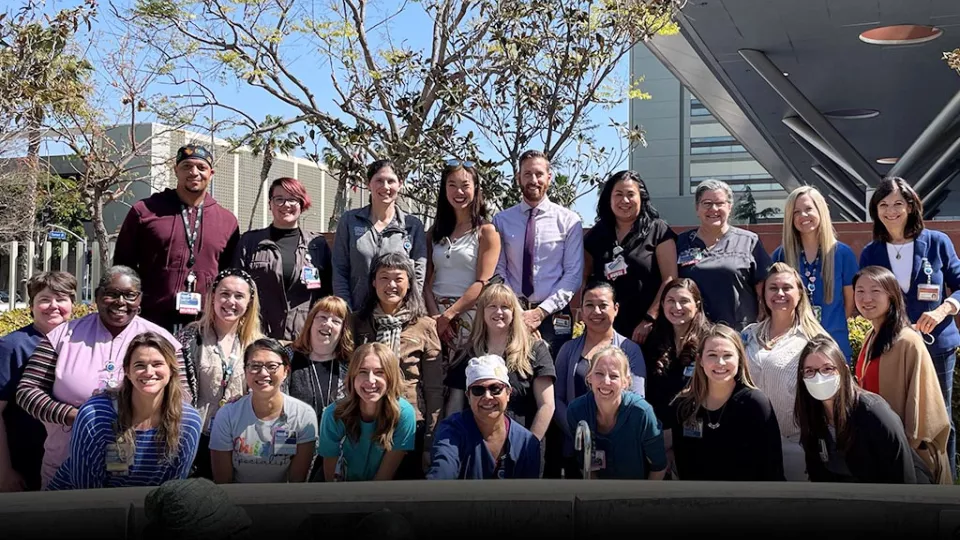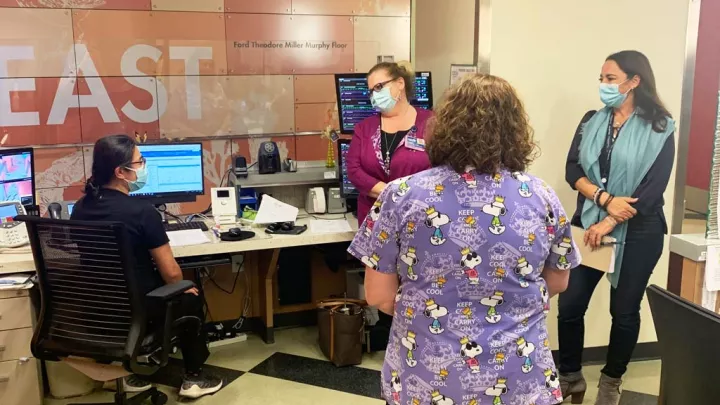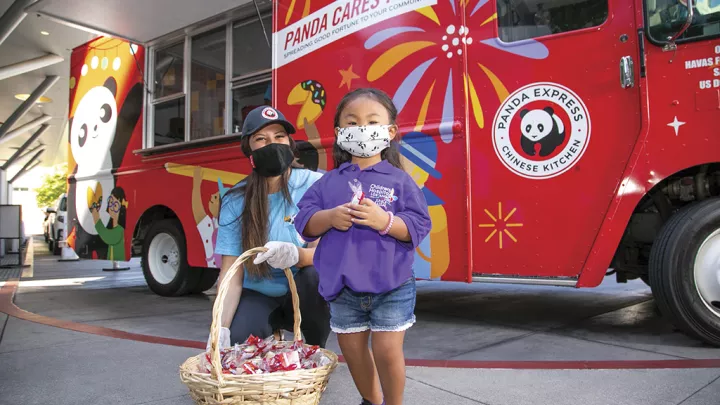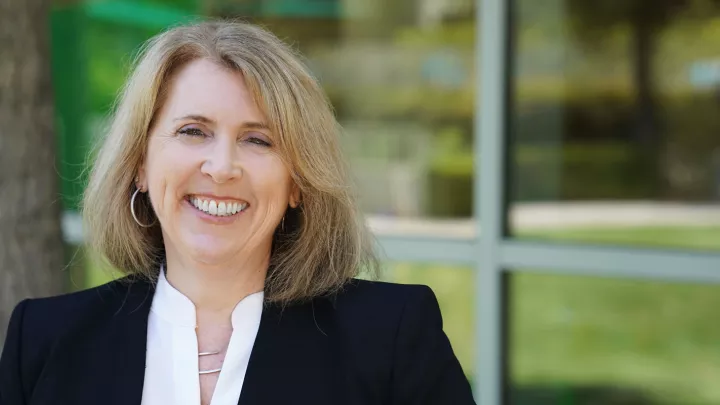
HeaRT for the Caregivers: Healing Response Team Bolsters Peer Support at CHLA
There has been a common perception that doctors, nurses and others in the health care field never let their jobs get to them. No matter how challenging the day, they just put it behind them.
“As health care providers, we don’t think twice about putting our needs aside for our patients and families,” says Susan Wu, MD, CHLA’s Medical Director of Quality and Clinical Effectiveness. “If something goes wrong, we are expected to keep going like nothing happened.”
Over the last two years during the COVID-19 pandemic, that misconception has been proven false. At Children’s Hospital Los Angeles, a new program provides emotional support for all team members. Through the Healing Response Team (HeaRT), volunteers are trained to give in-the-moment care and support to their peers.
“HeaRT is rooted in the understanding that we are all bonded to CHLA’s mission to create hope and build healthier futures,” says Leah Rybarczyk, LCSW, Healing Response Team Program Coordinator. “We recognize that our patients and families deserve our best, and it’s hard to be at our best when we’re not receiving care and support for the everyday stresses of our work.”
Stress injuries and the ‘second victim’ phenomenon
In August 2019, Dr. Wu brought together a diverse group of team members to conduct a needs assessment and create a process for supporting each other in the event of a stress injury or the “second victim” phenomenon.
A stress injury is a persistent psychological difficulty caused by a traumatic experience or prolonged periods of high stress or fatigue. Doctors, nurses, social workers and others in the health care field inherently encounter this type of injury through their daily work. Stress injuries can dramatically alter their ability to cope and can affect the quality of their work.
A similar injury can occur when caregivers experience what is known as the second victim phenomenon. In the hospital setting, first victims are the patients and families having their own injuries and trauma, be it a broken bone or a life-threatening illness. A second victim can be anyone else involved in a stressful event whose emotional and psychological well-being is negatively impacted by the experience. Second victims may feel personally responsible for a stressful event, second-guess their clinical skills or feel as though they have failed their patients.
“We know through experience and literature that there is a wide range of events that can create a second victim,” says Rybarczyk. “It could be the doctor performing CPR, the environmental services worker called in to clean a patient’s room after a code blue event, or the team member on the receiving end of a call about a critical patient transferring to CHLA. So much depends on our life experiences and role as professionals.”
Recognizing a ‘risk factor of the job’
In February 2020, Rybarczyk and Ilanit Brook, MD, MSHS, Chief Faculty Wellness Officer at CHLA, took the lead in developing an institution-wide peer support program.
Although Children’s Hospital Los Angeles isn’t the only hospital in the country with a peer support program, Rybarczyk points out that most other programs begin with just one floor or unit, usually the Emergency Department or an intensive care unit, and grow from there.
“At CHLA, we understand that no one has a more stressful job than anyone else. We have different roles, but everyone deserves support in the exact same way. So from the beginning we said, ‘We’re going to launch this program everywhere, all together.’”
Senior Vice President and Chief Medical Officer James Stein, MD, MSc, and Chief Nursing Officer and Clinical Officer Nancy Lee, RN, MS, are executive sponsors for the team. According to Dr. Brook, “It has been clear from day one that Dr. Stein and Nancy believe that our most precious resource is our team members. Bringing our support for each other into one collaborative program is a necessity and one that reflects our culture.”
The HeaRT training curriculum is largely based on the “Stress First Aid” model of care, which originated in the United States military and was translated for the health care setting by the National Center for Post-Traumatic Stress Disorder and the Schwartz Center for Compassionate Healthcare.
“What’s interesting is that the literature on stress first aid identifies the top 10 events that are always worth pausing for, and checking in on the people involved,” says Rybarczyk. “One of them is ‘anything involving children.’ At CHLA, that’s all we do! The natural order of things is not that children get sick and are hospitalized—and sometimes die. Yet our team members experience these traumas on a daily basis. It’s a risk factor of the job that people who work at banks and department stores don’t have.”
At Children’s Hospital, certain events are considered “automatic triggers” to which a peer supporter is immediately dispatched: every patient death, a code blue event (emergency/CPR), traumatic injuries, child abuse case, among others. But any team member who sees anything happening at the hospital that seems stressful can request peer support.
“We recognize that every trigger situation and every individual involved is worthy of a check-in by a peer supporter,” says Rybarczyk. “Because we just don’t know when or how something’s going to affect us.”
Caring for one another
HeaRT peer supporters attend a four-hour workshop that focuses on elements of stress first aid, teachings from a peer support program at Nationwide Children’s Hospital, and what Rybarczyk calls CHLA’s “home-grown” trainings. She credits her colleagues Helene Morgan, MSW, Elizabeth Arias, LCSW, and Alana Epstein, LCSW, for helping to develop the training.
A brief check-in is usually enough to alleviate a team member’s emotional response to an event. Peer supporters aren’t there to fix everything, but to make space for emotions—to sit, listen, process.
“We know that our team members are already giving support to one another,” says Rybarczyk. “It’s innate to being a caretaker, especially in a children’s hospital. We have found that they don’t always know what to say, how to say it, and maybe most importantly, when to hand it off.”
In those cases, HeaRT can call on one of the other outstanding peer support services at CHLA: the chaplains who lead “Tea for the Soul,” the Employee Assistance Program, social workers and psychologists. All of these specialists have skills that are complementary to HeaRT and help ensure team members get the support they need.
From the moment she received the first request for support in August 2021, Rybarczyk has considered the HeaRT program a success.
“Our peer supporters are unbelievable and just want to support one another, our patients and families,” she says. “The feeling that there’s at least one person in the hospital at all times who could show up to provide support—that’s a pretty big deal.”


